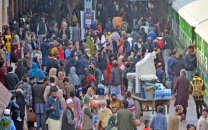Another blistering summer is here
Experts highlight the increase in concrete structures and the absence of green spaces as contributing factors

Khyber Pakhtunkhwa is sweltering under yet another intense summer. Over the course of this week, Peshawar, the provincial capital, and its surrounding areas have witnessed scorching temperatures exceeding 40 degrees Celsius.
According to the provincial meteorological office, D.I. Khan is expected to reach a sizzling 50 degrees Celsius, while Peshawar is bracing for temperatures to soar to 47 degrees Celsius within the first ten days of the upcoming month. With an extended heatwave forecasted to last through June, residents are being urged to prepare for the rise in mercury.
Soaring temperatures during the summer months are not uncommon for much of Pakistan. Just nine years ago, a devastating heatwave resulted in the loss of 1,200 lives. More recently, in 2022, record-breaking temperatures gripped the nation, leading to numerous fatalities, including dozens in Khyber Pakhtunkhwa (K-P).
Who to blame?
Experts, attributing the blistering heat to climate change, have frequently criticized both federal and provincial authorities for their failure to implement necessary measures aimed at mitigating its impact. Muhammad Tahir Khan Khattak, an architect and urban planner, told the Express Tribune that the provincial capital itself has become a ‘heat capsule’ with the city’s ‘unplanned’ infrastructure contributing significantly to rising temperatures.
Read more: Punjab heat wave intensifies, mercury to hit 45 degrees
Khattak squarely pointed fingers at the Environmental Protection Agency (EPA), decrying its failure to create a cleaner, greener environment. “Peshawar has transformed into a concrete jungle,” he lamented. “Many old trees have been cut in the name of development, but no one took notice.”
He explained that most of the land in Peshawar is either paved or built over, leaving no open or green space to absorb heat. “In road construction, it is common to leave some land open to absorb heat, but this practice isn't followed in Peshawar,” he added. Buildings in the city, he said, are largely made of concrete or glass, which retain or reflect heat.
Lack of planning
Professor Hizbullah Khan of the Environmental Science Department at the University of Peshawar said the province is suffering from the effects of climate change but also lack of planning. He noted that recent extreme weather, including continuous rains and hailstorms, has damaged key crops such as wheat and vegetables. Khan, too, lamented the lack of urban planning even in the provincial capital.
Read: Punjab shortens school hours as country braces for a scorcher
Adil Zareef, a public health expert, highlighted various factors contributing to rising temperatures and heatwaves in the city. He pointed to the Bus Rapid Transit (BRT) system as a significant factor due to its flawed design, which involves extensive use of concrete and steel that absorb and emit heat.
“The concrete routes and bridges of the BRT contribute to the heat island phenomenon,” Zareef said. He reminisced about Peshawar’s past, when the city was known for its greenery and flowers. “Development projects have led to the brutal cutting down of ancient trees, resulting in more heatwaves and higher temperatures for future generations.”
Zareef also noted that the loss of trees has made Peshawar more vulnerable to urban flooding. “The trees not only cooled the environment but also helped prevent floods,” he said. “Now, without them, Peshawar and its surroundings face a continuous threat from flooding.” He criticized the Pakistan Tehreek-e-Insaf government’s ‘Billion Tree Tsunami’ plantation drive, questioning the whereabouts of these trees.
According to details obtained by the Express Tribune, the massive reforestation project, spearheaded by former prime minister Imran Khan, reached its goal in 2017. However, the party has not discussed its flagship initiatives much since then.



















COMMENTS
Comments are moderated and generally will be posted if they are on-topic and not abusive.
For more information, please see our Comments FAQ